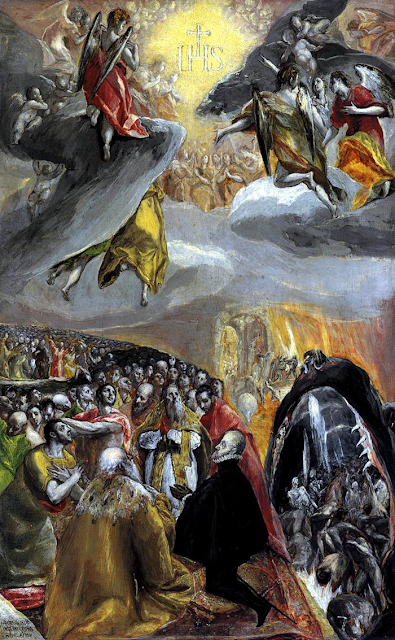Rescued by a Name
 |
| El Greco, The Adoration of the Name of Jesus |
By yon still river, where the wave
Is winding slow at evening’s close,
The beech, upon a nameless grave,
Its sadly-moving shadow throws.
— Henry Wadsworth Longfellow, Dirge Over a Nameless Grave
There is a kind of gloom that naturally arises within our hearts whenever we behold a nameless grave. But why is it so? What is so special about a name? And what is a name anyway?
St. Thomas Aquinas teaches that a name is given to signify someone or something.
It is given. No one assigns a name for oneself. We receive our name from someone who precedes us or is above us. Adam, who has dominion over God’s manifold creations, was tasked to name them. Yet there is one exception. Only God can assign His own name since no one precedes or is above God.
Moreover, it is given to signify someone or something. A name, especially a personal name, is not simply a sack of empty letters, but it truly represents the person it signifies. It is linked to a face, an identity. By recalling the person's name, we bring into our presence the person whom the name represents, indeed not physically, but spiritually through our intellect, memory, and imagination.
Think of a loved one, repeat his or her name with your lips, and see what happens. An image begins to emerge. A memory comes to mind. Passions are stirred, love and desire, sorrow and distress. We, so to speak, re-enact and participate again with our beloved in those events that have taken place. And the more you love this person, the more vivid the memory, the more intense the experience. A lover almost melts at the mention of the name of the beloved. His heart is enflamed, and he beams from ear to ear.
Perhaps this is why there is a sense of loss when we behold a nameless grave. The person who lies beneath the gravestone is almost without a face. He is stripped of his identity in the eyes of the beholder. Though they may have the most incredible lives and the most fascinating stories, the living cannot recall them because they know not who they are. We cannot reach back and participate in their stories, however splendid they are.
But God did not leave us with a nameless grave. He is not a figure from the distant past whose story is buried and whose memory is erased from the hearts of men. Neither is He a person without a face. By His divine condescension, God humbled Himself and took upon a human face. He, whose name is given by no one, revealed to us His Most Holy Name, Jesus, so that whoever “calls upon the name of the Lord will be saved (Rom 10:13).” “And there is no other name under heaven given among men by which we must be saved (Acts 4:12).”
How can we be saved by calling upon His name?
We are forgetful creatures. Yet just as it is when we pronounce the name of our loved ones repeatedly, we bring to mind the memory of the one we invoke, so it is when we invoke the name of Jesus. As we repeat his name on our lips, the face of Christ emerges, the sweet memory of his passion is evoked, and the effect of his sacrifice is made present. Reaching back to the cross, there we behold Him whose heart was pierced and whose blood was poured out for our sins. If only we comprehend a fraction of His infinite love for us, our hearts will not remain tepid. Hence, no matter how forgetful we are, if we acquire the habit of repeating his Most Holy Name, God shall light up the dried firewood of our words with the burning flame of His love.
No shadow, gloom, or darkness remains in the heart of the one who knows and calls upon His name. His heart is filled with Christ, who has rescued him from the grave.


Comments
Post a Comment